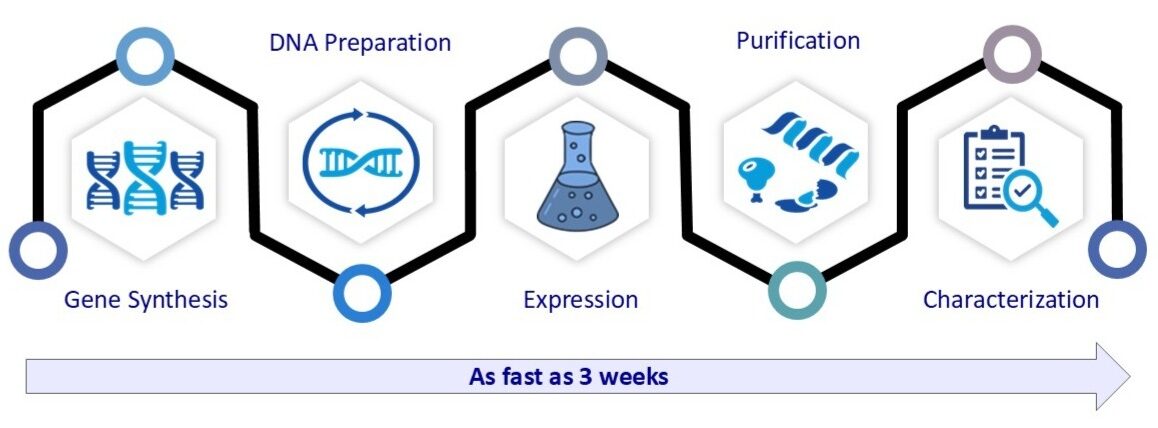Evotec’s expression platform delivers flexible, scalable, and high-throughput protein expression services to accelerate drug discovery and biologics development. With expertise across bacterial (E. coli), yeast (Pichia pastoris, Saccharomyces), insect (baculovirus, BacMam), and mammalian (CHO, HEK293) systems, the platform supports the production of simple and complex proteins, antibodies, and membrane targets. Optimized workflows ensure high-titer expression, reproducible quality, and seamless scalability from milligram to multigram quantities, enabling robust solutions for research, structural biology and therapeutic applications.
Evotec Expertise
Evotec’s protein expression services use diverse host systems, high-throughput optimization, and advanced analytics to deliver scalable, high-yield proteins, including solutions for complex membrane targets.

Gene-to-protein expression workflow
- Scalable workflows from 1mL to 48 L
- Bacterial systems with flask & large scale fermentation capabilities
- Yeast systems with flask & large scale fermentation capabilities (Saccharomyces, Pichia pastoris)
- Insect expression with flask & bioreactor capabilities (Sf9, Sf21, Tni and S2)
- Mammalian expression with flask & metabolite controlled bioreactor capabilities (CHO, HEK293 )
- Stable cell line generation for high-yield mAbs
- Expression optimization for high-titer antibody yields up to g/L
- Customized production for purity and low endotoxin
- Membrane protein workflows for GPCRs and other complex targets
- Supporting tech: CRISPR for knock-in/knock-out capabilities, automated pipelines, bespoke QC packages
Featured Protein Expression Services
Frequently Asked Questions
Q: What types of tags can be used to express a protein?
Evotec evaluates affinity tags (His, FLAG, StrepII) and fusion partners (GST, MBP, albumin) at both termini. Protease sites (TEV, HRV3C) to enable tag removal, and Avi-tags to allow site-specific biotinylation for in vivo or in vitro use.
Q: What if the best-expressing construct is aggregated?
Aggregation is assessed during expression scouting using SDS-PAGE, Western blot, and analytical/fluorescent SEC (aSEC/fSEC) to evaluate purity and monodispersity.
Q: How are target yields estimated at the expression stage?
Yields are approximated with densitometric analysis from small-scale affinity pulldowns during early workflows.
Q: What level of purity can be expected?
Final purity typically exceeds 95%, verified by SDS-PAGE and densitometry. DNA contamination is checked by UV/Vis (A260/A280 0.55–0.6). Low-endotoxin purification and BET validation ensure suitability for in vivo studies.
Q: What expression scales are supported at Evotec?
Scales range from 1 mL cultures in 96-well plates for high-throughput screening to 48 L microbial fermentations and 25 L mammalian cultures in shake flasks or Wave Bag bioreactors.
Q: Is thermal stability assessed during scouting?
Yes. nanoDSF can be performed on elution fractions to identify thermostable constructs for downstream applications.
Q: Can detergent scouting be performed for membrane proteins?
Yes. Detergent screening is available during or after expression to determine optimal solubilization conditions.
Q: Can Evotec generate expression libraries?
Yes. Evotec designs custom expression libraries in yeast and bacterial systems, supporting library generation strategies for diverse applications.
Q: What defines high-throughput expression at Evotec?
Routine scouting may test 2–4 constructs. For challenging proteins, up to 48 construct-tag combinations are evaluated. High-throughput expression can reach 96–192 constructs in parallel.
Q: What is BacMam expression, and does Evotec support it?
Yes. BacMam uses recombinant baculovirus with a mammalian promoter to express proteins in mammalian cells. Evotec supports Bac-to-Bac and HR-Bac systems.
Q: How is the expression host selected?
Host selection depends on expression data, downstream applications, post-translational modification needs, and target yield. Systems include E. coli, yeast, insect, and mammalian platforms.

